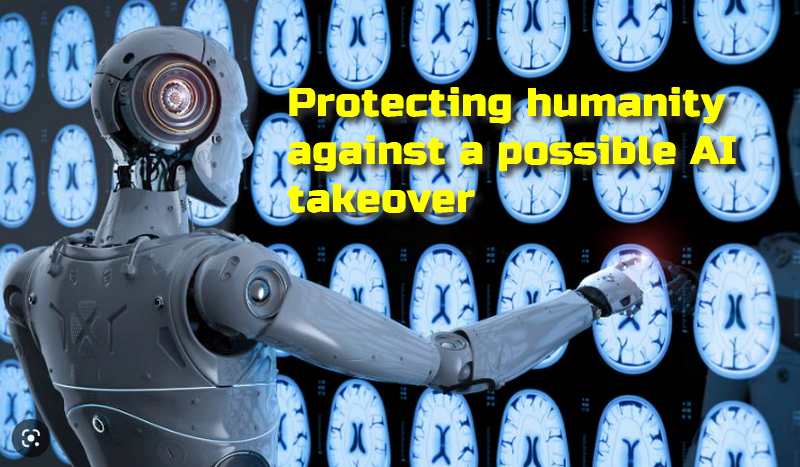Protecting humanity against a possible AI takeover.

By Chat-CPT - Human Synthesis - 01 May 2023
Protecting humanity against a possible AI takeover is an important consideration as AI technology continues to advance. While it's crucial to approach this topic with foresight and caution, it's worth noting that the current capabilities of AI do not pose an immediate threat to a takeover.
However, it's prudent to establish safeguards and guidelines to ensure the responsible development and use of AI technology. Here are some key measures to consider:
- Ethical Frameworks: Promote the development and adoption of ethical guidelines and frameworks for AI research, development, and deployment. These frameworks should prioritize human values, safety, and well-being.
- Robust Regulation: Encourage governments and regulatory bodies to establish clear and comprehensive regulations for AI technology. These regulations should address safety, privacy, transparency, and accountability in AI systems.
- Research and Development: Foster continued research into AI safety and the development of mechanisms that prevent unintended consequences or misuse. Encourage interdisciplinary collaboration involving experts from various fields, including computer science, philosophy, psychology, and ethics.
- Human Oversight: Ensure that humans maintain control over critical decision-making processes. Implement mechanisms that allow human intervention and supervision in AI systems, especially in domains with significant potential impact on human lives.
- Transparency and Explainability: Promote transparency and explainability in AI systems, enabling users and regulators to understand the decision-making processes of AI algorithms. This fosters trust and allows for the detection and mitigation of biases or unintended behaviors.
- Continuous Monitoring: Establish ongoing monitoring and auditing processes to assess the behavior and impact of AI systems. This helps identify and address potential risks or biases that may emerge over time.
- Education and Public Awareness: Promote public understanding and awareness of AI technology to dispel myths and misconceptions. Educate individuals about the potential benefits and risks associated with AI, fostering informed discussions and public engagement.
- International Collaboration: Encourage international collaboration and cooperation to establish common standards, guidelines, and regulations for AI. This helps avoid a fragmented approach and facilitates global efforts to address potential risks.
It's important to emphasize that the development of strong AI safety measures should be a collective effort involving governments, researchers, industry leaders, and the public. By proactively addressing the risks associated with AI, we can ensure its responsible and beneficial integration into society while minimizing potential threats to humanity.
The passage above shared highlights of a significant question regarding the long-term implications of achieving strong artificial intelligence (AI) that surpasses human cognitive abilities. The notion of a superintelligent AI system capable of recursive self-improvement, leading to an "intelligence explosion," has been a topic of discussion within the field of AI.
The potential benefits of such a superintelligence are immense. With its advanced problem-solving capabilities and the ability to invent revolutionary technologies, it could contribute to solving major global challenges like war, disease, and poverty. This perspective suggests that the creation of strong AI could be a monumental event in human history, bringing about significant positive changes.
However, there are concerns associated with the development of superintelligent AI. One key concern is the alignment of goals between humans and AI systems. As AI becomes increasingly capable, ensuring that its objectives are aligned with human values and interests becomes crucial. If we fail to properly align these goals before the AI system reaches superintelligence, there is a potential risk that its actions could diverge from our intentions, leading to unintended consequences or even posing existential risks to humanity.
To address these concerns, researchers and experts in the field of AI safety advocate for developing robust frameworks for value alignment, ethics, and safety measures. It is essential to establish guidelines and precautions to ensure that superintelligent AI systems are designed with human values in mind and act in accordance with our best interests.
Overall, the passage you provided encapsulates the contrasting possibilities and challenges associated with the potential achievement of superintelligent AI. It emphasizes the need for careful consideration, research, and responsible development to maximize the benefits while minimizing the risks of this transformative technology.
The impact of Artificial Intelligence (AI) on human rights is one of the most crucial factors that will define the period in which we live. AI-driven technology is entering more aspects of every individual’s life, from smart home appliances to social media applications, and it is increasingly being utilized by public authorities to evaluate people’s personality or skills, allocate resources, and otherwise make decisions that can have real and serious consequences for the human rights of individuals. As stressed by the Commissioner for Human Rights in a Human Rights Comment, finding the right balance between technological development and human rights protection is therefore an urgent matter.
In accordance with the mandate of the Commissioner for Human Rights to promote the awareness of and effective observance and full enjoyment of human rights in Council of Europe member states as well as to provide advice and information on the protection of human rights (Articles 3 and 8 of Resolution (99) 50 of the Committee of Ministers), the Commissioner issues this 10-point Recommendation on AI and human rights.
The above emphasizes the significant impact of artificial intelligence (AI) on human rights in our current era. It highlights how AI-driven technology is becoming increasingly pervasive in various aspects of people's lives, ranging from household appliances to social media platforms. Additionally, it discusses the growing utilization of AI by public authorities to assess individuals' personalities, and skills, and allocate resources, thereby making decisions that can profoundly affect human rights.
The comment references the Commissioner for Human Rights, who stresses the importance of finding a delicate balance between technological advancements and the protection of human rights. Considering the Commissioner's mandate to promote awareness, observance, and enjoyment of human rights in Council of Europe member states, as well as provide advice and information on human rights protection, the Commissioner has issued a 10-point Recommendation on AI and human rights.
The intent of this comment is to underscore the urgency of addressing the potential human rights implications of AI technology and to highlight the need for guidelines and recommendations to ensure that the development and implementation of AI systems align with the protection of human rights.
Good morning. See this? On the radio today, Glenn pointed to a new, harrowing study finding that 50 percent of AI researchers believe there is a 10 percent or greater chance humans will go extinct because we cannot control AI. If you were about to board a plane, and half of its engineers said there was more than a 10 percent chance the plane would crash, would you still board the aircraft?
ChatGPT
Good morning! As an AI language model, I don't possess personal experiences, emotions, or physical presence, so I don't have personal preferences or the ability to board an aircraft. However, I can provide you with some information that may help you make a decision in this hypothetical scenario.
When it comes to matters of safety and personal risk, it is important to consider a variety of factors. If half of the engineers responsible for building and maintaining an aircraft expressed concerns about its safety, it would be prudent to take their warnings seriously and investigate further. The decision to board the aircraft ultimately depends on the assessment of the risks involved and your level of comfort with those risks.
In the case of AI researchers expressing concerns about the risks associated with AI, it is crucial to understand the specific context and details of the study they are referencing. The field of AI research is vast, and opinions and beliefs can vary among researchers. While some researchers may express concerns about the risks of uncontrolled AI, it is also worth noting that the development of AI systems often involves safety measures and ethical considerations.
If you are concerned about the potential risks of AI, it may be helpful to explore the subject further and understand the different perspectives within the field. Engaging in discussions, reading scientific literature, and staying informed about the latest advancements can contribute to a better understanding of the benefits and risks associated with AI technologies.
Ultimately, the decision to board an aircraft or embrace AI technologies involves weighing the perceived risks against the potential benefits and making an informed choice based on available information
This is the start of the preparation for a guard against an IT takeover.

Tore Christiansen - Human Synthesis
